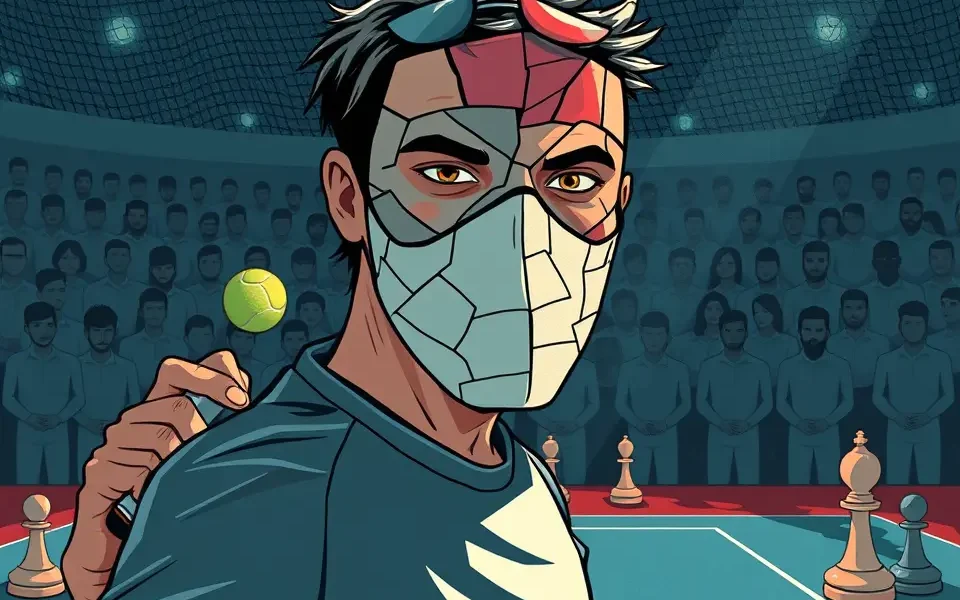Carlos Alcaraz, the young Spanish tennis sensation, has often been lauded for his refreshing honesty and openness, however, his recent candid comments after a defeat have sparked debate. Following his loss to Jack Draper at Indian Wells, Alcaraz revealed his pre-match anxieties and struggles with focusing on his own game, leading some to question whether such transparency is a tactical error, potentially providing opponents with a psychological advantage. Is Alcaraz’s brutal honesty a sign of mental insecurity, or simply a testament to his genuine character?
Alcaraz’s Vulnerability: A Rare Glimpse Behind the Champion’s Facade
In the high-stakes world of professional tennis, athletes often cultivate an image of unwavering confidence and mental fortitude. Tennis legends like Novak Djokovic and Rafael Nadal are known for their ability to maintain a poker face, rarely revealing any chinks in their armor. Alcaraz’s post-match comments were a stark contrast to this norm. He openly discussed his feelings of unease, admitting that he struggled to focus on his own strengths due to excessive preoccupation with Draper’s game and tactics. He even shared details of a pre-match conversation with his coach, Juan Carlos Ferrero, highlighting his difficult day and feeling “out of sync” on the court.
This level of vulnerability is unusual among top athletes, where maintaining an invincible facade is often considered part of the game. Alcaraz’s willingness to expose his pre-match nerves and mental struggles has surprised many, raising questions about the wisdom of such transparency.
The Psychological Game: Has Alcaraz Given Rivals an Edge?
Champions are often revered for the aura of invincibility they project, which can intimidate opponents before they even step onto the court. Alcaraz, with his post-match confessions, has arguably disrupted this perception. By revealing his vulnerabilities, he may have inadvertently instilled a newfound confidence in his rivals, particularly those eager to dethrone him.
His comments might embolden other players in the locker room who are keen on dethroning him. This candid revelation, following his first loss at Indian Wells in three years, will not go unnoticed by his opponents. While Alcaraz’s honesty makes him relatable to tennis fans, it raises questions about the wisdom of such transparency.
Ferrero’s Perspective: Tactical Growth and Reading the Game
Alcaraz’s coach, Juan Carlos Ferrero, has emphasized the importance of tactical understanding and match awareness for the young player’s continued development. Ferrero believes that Alcaraz needs to “grow tactically, to know how to read the matches a little bit better,” which comes with experience. He also highlights the need to learn from top rivals like Jannik Sinner, Novak Djokovic, and Daniil Medvedev, understanding their strengths and weaknesses.
Ferrero’s insights suggest that Alcaraz’s preoccupation with his opponent’s tactics, as revealed in his post-match comments, might stem from a developmental area that needs further attention. While Alcaraz possesses exceptional natural talent and athleticism, mastering the mental and tactical aspects of the game is crucial for sustained success at the highest level.
Mental Fortitude: A Work in Progress
Alcaraz himself has acknowledged the importance of the mental game in tennis, stating that “the mental game is really important, the way you talk to yourself before the matches.” He recognizes that playing against top players requires a strong mindset and the belief in one’s own abilities. However, he has also admitted to experiencing setbacks in his mental game, particularly after demanding stretches of competition.
In the past, Alcaraz has openly discussed his struggles with controlling his emotions and maintaining focus during matches. These admissions suggest that mental fortitude is an ongoing area of development for the young Spaniard. While he has demonstrated remarkable mental strength at times, particularly during his Grand Slam victories, consistency in this area remains a challenge.
Expert Analysis: Honesty vs. Strategy
Tennis experts are divided on whether Alcaraz’s honesty is a virtue or a strategic flaw. Some argue that his openness is refreshing and makes him more relatable to fans, while others believe that it could provide opponents with valuable insights into his mental state, potentially giving them a competitive edge.
Ultimately, the impact of Alcaraz’s honesty on his performance remains to be seen. It is possible that his vulnerability will make him a more resilient and mentally tough player in the long run, as he learns to cope with pressure and manage his emotions more effectively. However, it is also possible that his transparency will continue to be a source of scrutiny and a potential weakness that opponents will try to exploit.
The Path Ahead: Learning and Evolving
Despite the debate surrounding his recent comments, Carlos Alcaraz remains one of the most exciting and promising talents in tennis. His exceptional athleticism, dynamic playing style, and infectious enthusiasm have captivated audiences worldwide. As he continues to mature and gain experience, he will undoubtedly learn to navigate the complexities of the mental game and find the right balance between honesty and strategic awareness.
Alcaraz’s journey is a testament to the fact that even the most gifted athletes are constantly evolving and striving to improve, both on and off the court. His willingness to be open and honest about his struggles is a reminder that vulnerability is not necessarily a weakness, but rather an opportunity for growth and self-discovery.








No Comment! Be the first one.